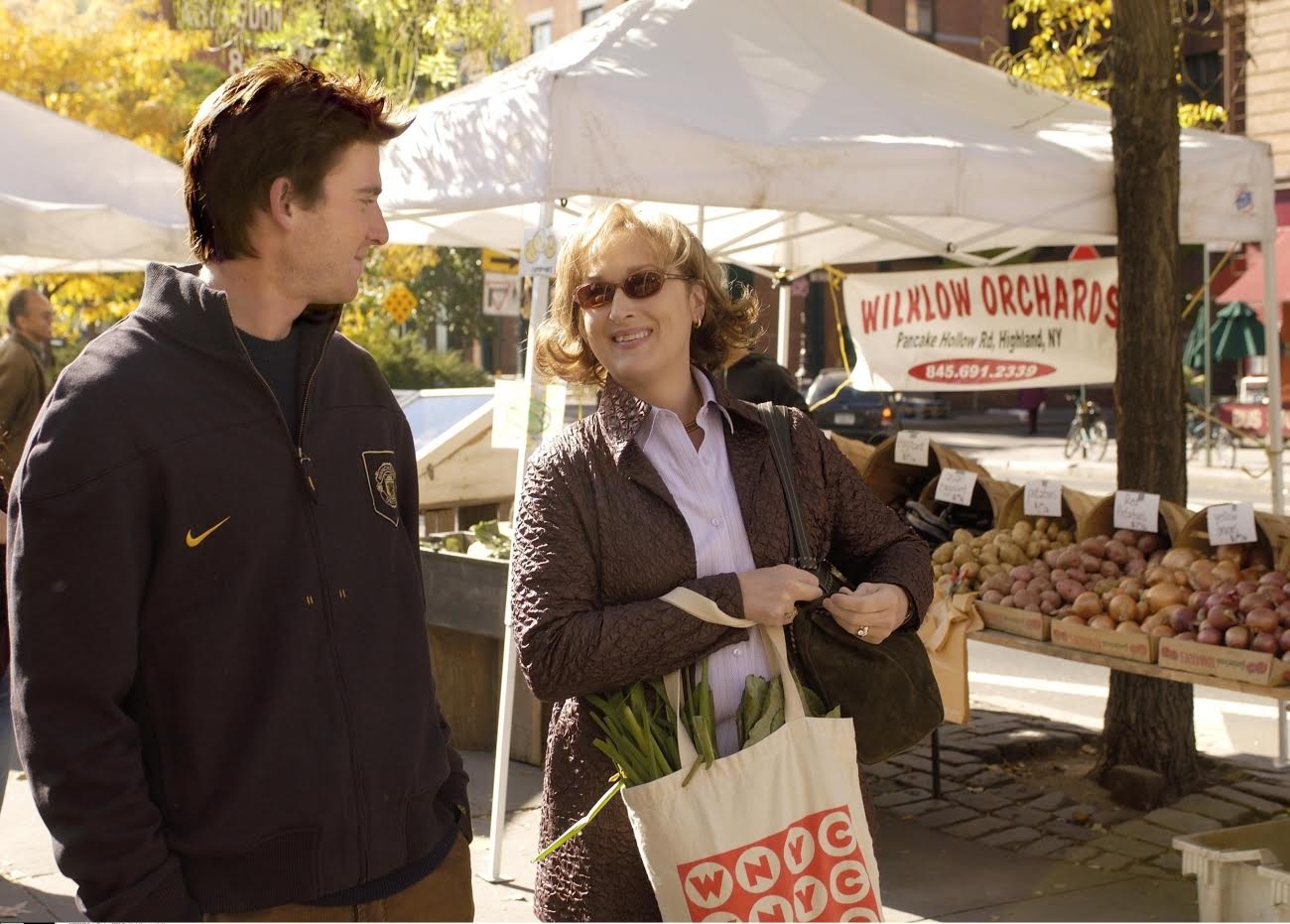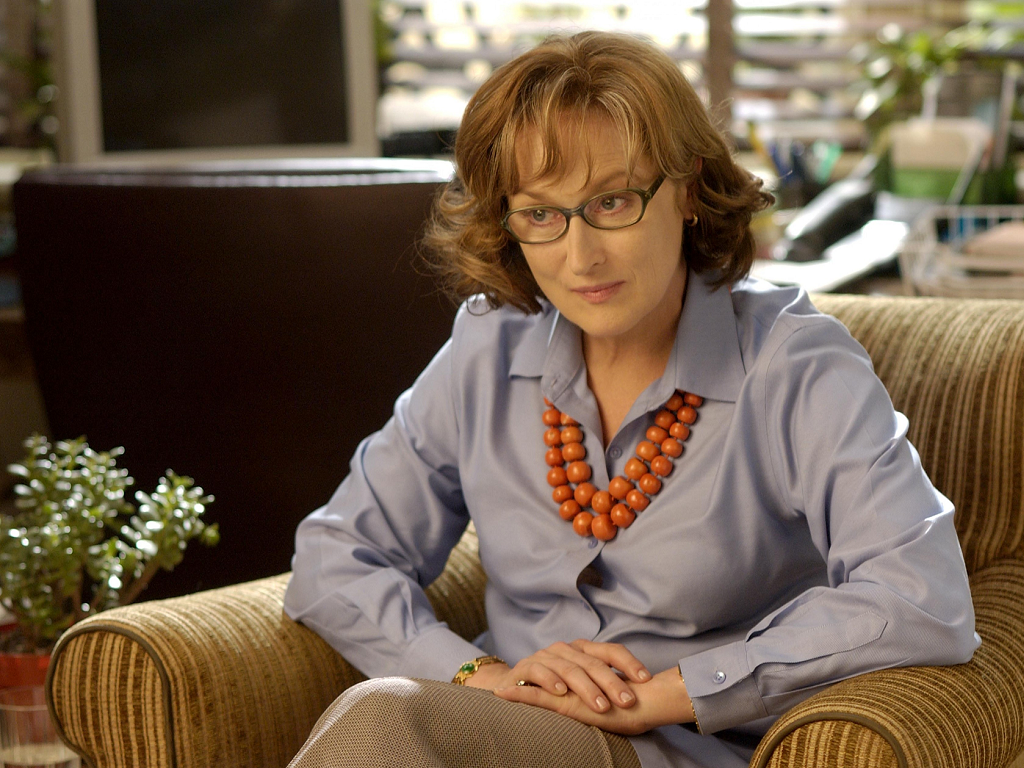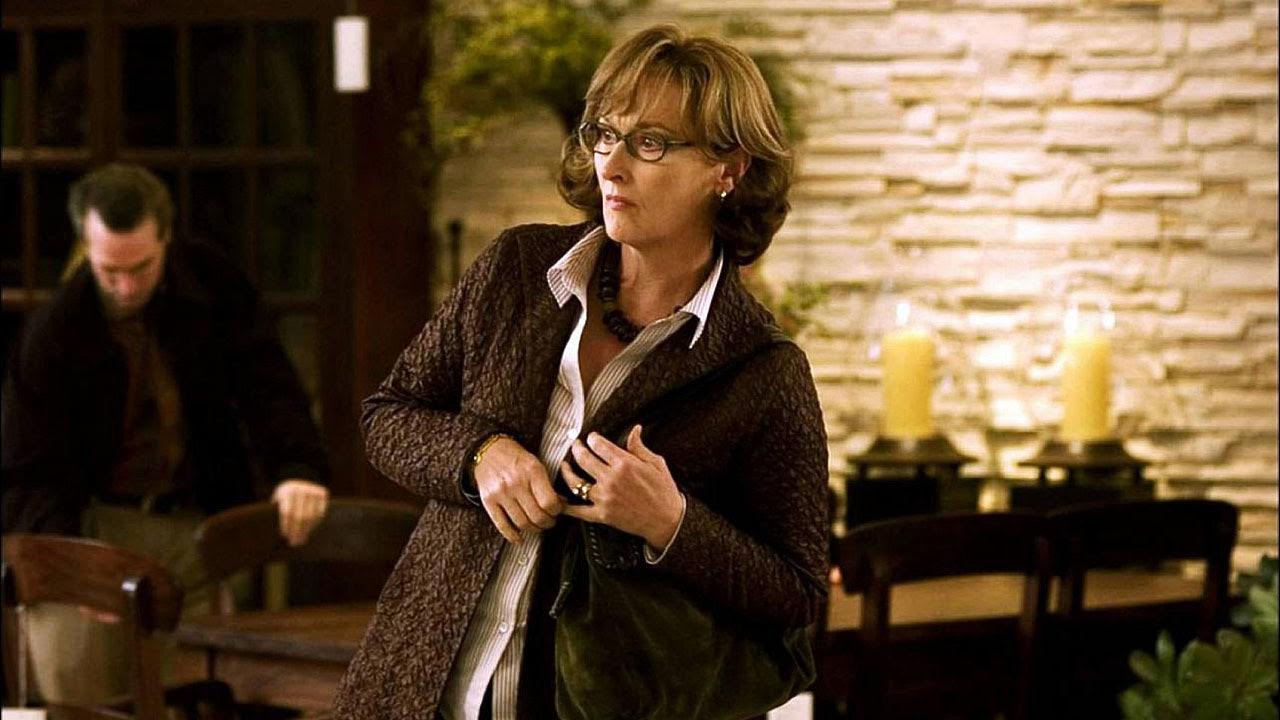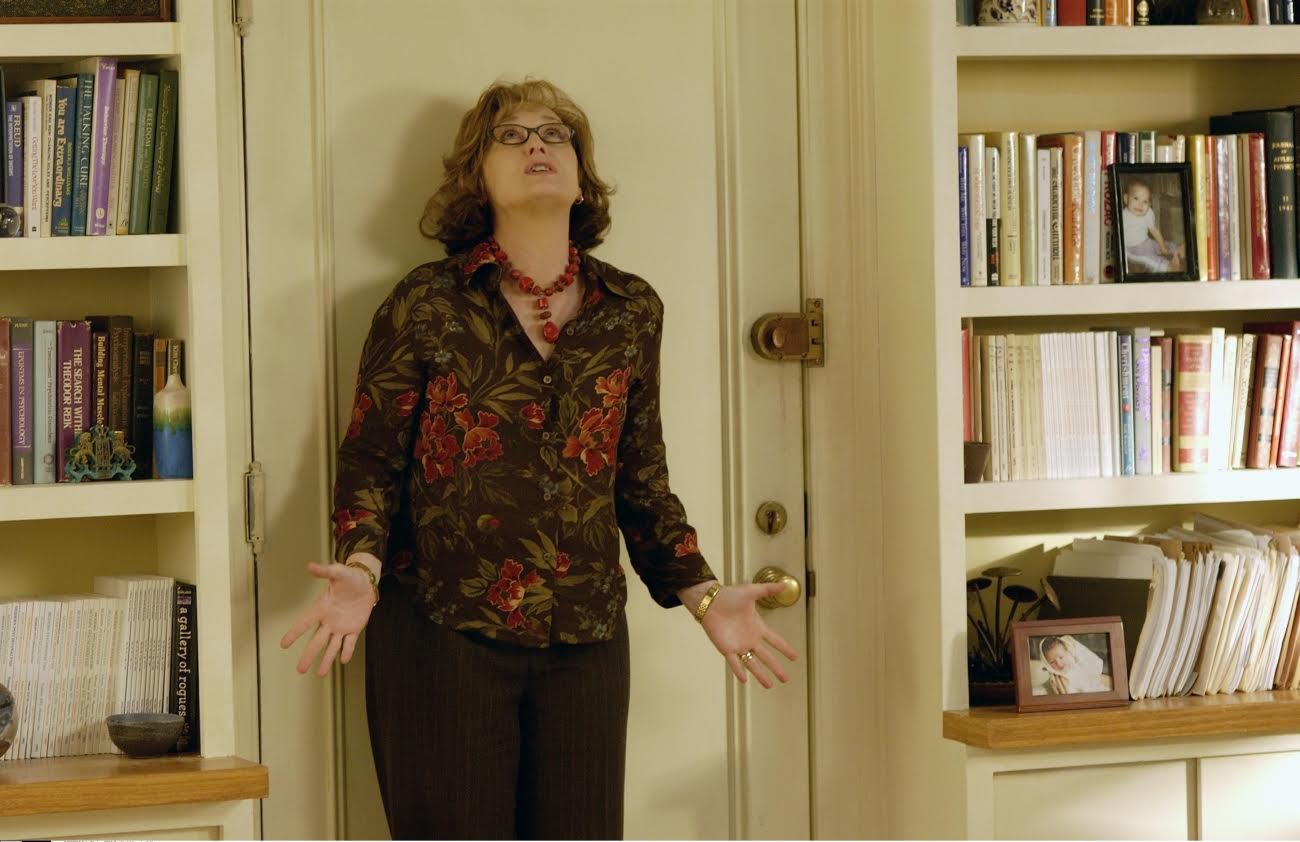John and Matthew are watching every single live-action film starring Meryl Streep.
 Meryl Streep as therapist with Uma Thurman as her client in Prime (2005)
Meryl Streep as therapist with Uma Thurman as her client in Prime (2005)
#32 — Lisa Metzger, an Upper West Side therapist whose client begins dating her much younger son.
JOHN: The most depressing thing about Prime is that director Ben Younger reportedly spent eight years writing it. Equally depressing is the sight of Meryl Streep, Actress of Her Generation, wasting her time on this insipid project, and the subsequent dearth of roles for actresses over fifty that her involvement signifies. Here’s a fun kernel for a comedy skit: a kooky, Upper West Side therapist learns that the 37-year-old woman she is treating has begun dating her 23-year-old son, ensuing comic hijinks, oversharing, and ethical quandaries between therapist, son, and client. Now, imagine that idea stretched out for nearly two hours, sans comedy or romance, and you’d have Prime, easily one of the worst movies in Streep’s filmography...
Prime is shot and edited so wonkily it almost qualifies as experimental; numerous cuts confound expectations of even basic film grammar. Take, for instance, the indelible montage of Rafi (Uma Thurman) and David’s (Bryan Greenberg) early intimacy, in which Thurman asks Greenberg, “You’ve never heard of Coltrane?” “Is this that Negro music?” he jokingly responds, and seconds later they are inexplicably making out. This is followed by Thurman in a Japanese restaurant salivating over quail eggs; “They’re known to be an aphrodisiac,” she claims, and before you know it, these two are at it again! Prime is so estranged from reality that it begins to resemble The Room, but it at least provides the sight of Meryl Streep sporting a WNYC tote bag while shopping at her local farmers market.

Such small treasures are, however, few and far between. Streep’s Dr. Lisa Metzger mostly plays second fiddle to Rafi and David as they fall in and out of love, move in together, and navigate their generational gap. Bespectacled, her hair short and curly, and sporting large, clunky necklaces, Streep is working hard from her very first shot to sell this woman as an overtly comic presence. Her accent work begins as someone from New Jersey but that quickly disappears, and instead Streep speaks as though she is impersonating a woman she heard on line at Zabar’s. As Thurman’s therapist, Streep is a soothing and often warm presence, doling out relationship advice while trying hard not to react to Thurman’s candid admissions. But this is only half of Streep’s Lisa; the other is a domineering and devout Jewish mother who chides and nags her son with Olympian vigor. These two sides of Lisa’s personality rarely coalesce into something resembling a person.
Though it enlivens the material considerably, Streep’s performance remains merely the fulcrum of the plot’s central joke. You spend half the time watching her and the other wondering what possessed her to enlist her services. The actress’ pivotal scene, in which Lisa realizes that the young man Rafi has been describing is actually her son David, is perhaps her finest moment and the very reason why Streep took on the role. Nervously pouring and drinking cups of water, barely attempting to hide her aghast response when Rafi describes David’s “perfect penis,” Streep is genuinely funny for a few minutes, as broad and high-pitched as the rest of her performance, except that in this scene her theatrics fit the moment.
Do you see anything different? Why would Streep do this? Is there anything else to salvage from this trainwreck?

MATTHEW: Since the majority of Lisa’s scenes are seemingly set within a three-block radius somewhere above West 72nd Street, Prime would appear to be one of those conveniently-located projects that Streep can knock off in a mere matter of weeks, which might explain but does not excuse her participation in this fiasco.
Greenberg is a hunky blank slate, while Thurman, replacing the originally attached Sandra Bullock (who smartly departed over script issues), has no obvious feel for comedy. Even more egregious is that Younger’s lunkheaded vision of New York multiculturalism features some of the most jaw-droppingly inane depictions of black people I’ve ever seen, from the anonymous, unseen-in-the-flesh women that David, an aspiring artist, paints in his exploitative portraits of Real New Yorkers to Rafi’s doorman (Ato Essandoh), who scowls in silence when David condescends to him with a fist-bump early on before deciding, at the romantic climax, that he just wants to see these two awful white people end up together after all. This is a film oblivious to its privilege, brought to life by a filmmaker who assumes that putting his Caucasian leads in the occasional presence of people of color and other minorities will excuse all the racist, sexist, and homophobic garbage that is casually spouted from beginning to end.
What, then, is the star of Silkwood and The Bridges of Madison County doing in such dire company? The character is written as a stereotype of the finicky Jewish mama and subsequently played as one by Streep, who, with her elongated vowels and endlessly gesticulative hands, is not so much working from a predetermined process as simply riffing on a caricature of a human being. (I’ve seen this performance speculatively described, in some corners, as Streep’s revenge on her loudest skeptic, Pauline Kael, but to what end?)

As an actor’s director, Younger is no Mike Nichols or a Jonathan Demme, but he’s even miles away from being a Jerry Zaks or a Brad Silberling. He, unsurprisingly, gives Streep carte blanche to fill her frames as she pleases; Streep responds by rearranging her body and rolling her shoulders without end to add some — any — animation to the therapy sessions that comprise more than half of the performance, and scratching, biting, and wiggling during the humdrum dialogues where Lisa is off the clock. Younger shows us close-up after close-up of Lisa rummaging through her mind, but there are no discernible thoughts made readable to the viewer.
You noted above that Streep makes an immodest and fitfully funny exhibition of her discomfort during a tell-all therapy session. When the discussion ends, Streep flops down on the couch to quake and hyperventilate with self-induced hysterics. In moments like this, Streep’s physical tics and verbal curlicues get her laughs, but they’re not so much creative, character-specific gestures as desperate attempts to give these flat, stop-and-start scenes a pulse by any means necessary.
When Lisa finally decides to put an end to her strategizing and come clean to Rafi about all the moral and ethical breaches she has made, Streep is left with very little to play beyond peacemaking niceties. In her final scene, we find Lisa offering learned advice about The Ways of the Heart to her dipshit son, who is once again in the doghouse for sleeping with one of Rafi’s colleagues during their breakup. It’s one of the spare scenes in Younger’s film that suggests that Lisa might be an honest-to-goodness woman rather than a primitive cartoon of one, but by then such a deed is far too late. Prime is the kind of abomination that makes you actually start to resent Streep for offering her talents, never mind her prestige, to a project so tone-deaf and beneath her.
 WHY, MERYL, WHY?
WHY, MERYL, WHY?
With the major exceptions of Postcards from the Edge and Death Becomes Her, Streep largely struggled in her early and mid-career to find comedic vehicles that matched, rather than vandalized, her brilliant if occasionally broad expertise in this genre. Prime represents the absolute nadir of these endeavors, but the following year would bring two fruitful and fascinating comic collaborations to wipe away any and all memories of the loathsome clinker that preceded them. The first of these projects would initiate a heaven-sent meeting with one of American cinema’s most gloriously idiosyncratic chroniclers of the human condition. And the second would introduce a whole new generation of fans to the uncanny and entrancing character-building of this unvanquished acting legend.